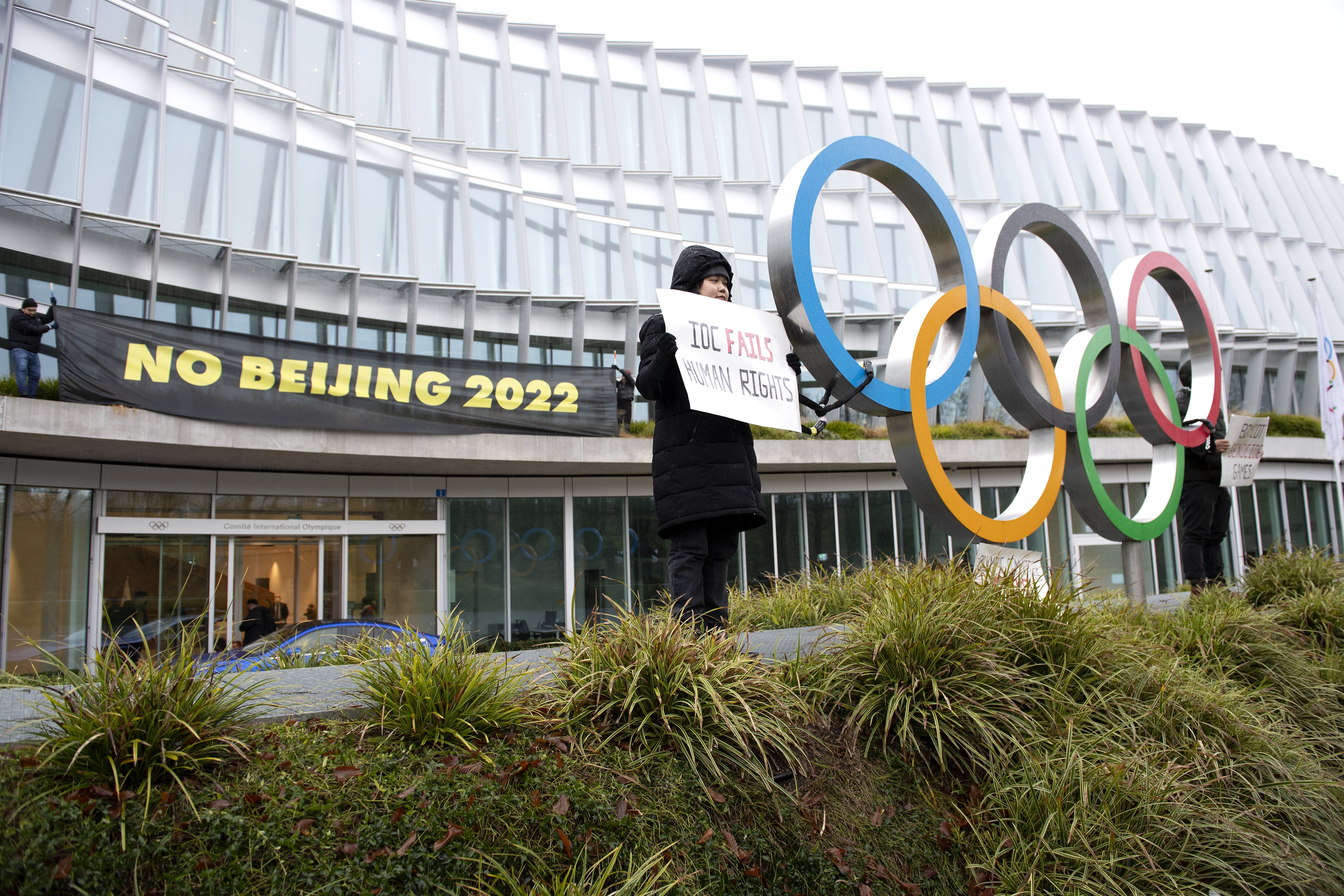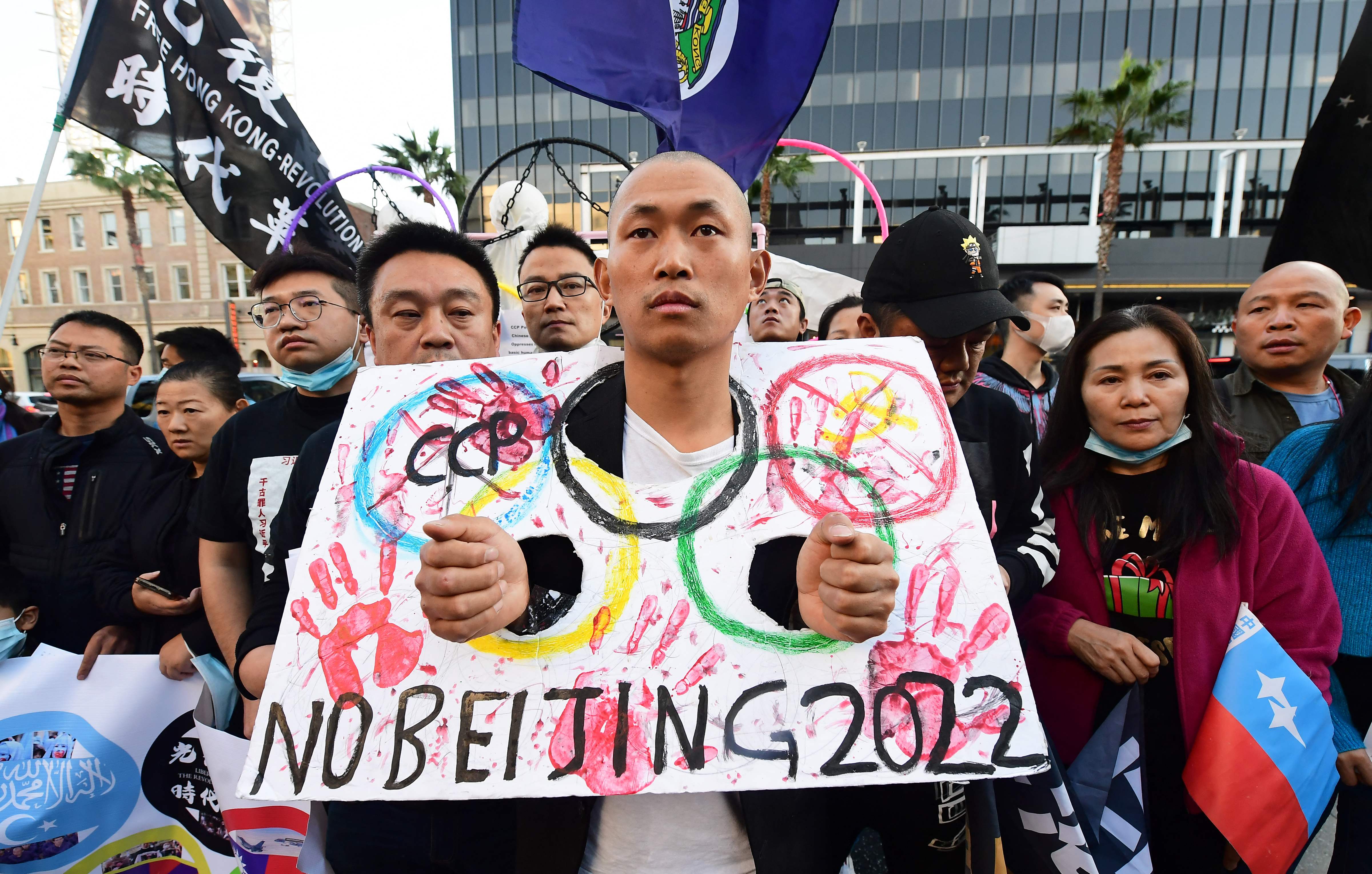How the Olympics boycott saga is a US-China proxy battle for global influence
The US diplomatic boycott of the Winter Olympics could backfire if only a few other countries follow suit and Beijing spins the narrative to its advantage, writes Ahmed Aboudouh


The US’s diplomatic boycott of the 2022 Beijing Winter Olympics was intended as a firm rebuke of China over its human rights record.
Yet the fact Washington has not directly lobbied for other governments to do the same may be a subtle message to Beijing that it does not want to take things too far and critically damage relations between the two superpowers.
Analysts say many countries are now facing a dilemma over whether to follow the US’s lead and risk alienating China, in a saga that could shift the countries’ global influence.
So far, Australia, Canada and the UK have announced that they will also refrain from sending their officials to the Games in February, citing China’s detention and abuse of Uyghur Muslims in Xinjiang, the crackdown on democracy in Hong Kong, and its escalation of tensions with Taiwan.
A diplomatic boycott is largely symbolic as the countries’ athletes will still attend the event. The last full boycott was in the 1980 Moscow Olympics when the US and dozens of other countries protested the Soviet Union’s invasion of Afghanistan. The Soviet bloc and allies retaliated with a boycott of the 1984 Los Angeles Olympics.
New Zealand said it would not send its officials to Winter Olympics but couched the announcement by citing Covid restrictions rather than human rights concerns.
Japan said it is contemplating a boycott, yet other staunch US allies across Asia and the Pacific - such as South Korea, India and the Philippines - have not made similar noises.
“We can see a great deal of strategic ambiguity among US allies, especially as these support the US diplomatically, but economically they continue their business as usual with China,” Zeno Leoni, a teaching fellow at the Defence Studies Department of King’s College London, told The Independent.
Europe remains divided as to which EU members will send official delegates.
France, which seeks the EU leadership after the departure of German Chancellor Angela Merkel and is taking over presidency of the bloc in January, is expected to push for a joint European stand on the issues when EU foreign ministers meet again on Thursday.
However, France’s education minister Jean-Michel Blanquer said on 9 December that France would not take part in any boycott.
Several other EU countries, including Germany and the Netherlands, have called for a united front and common position. This seems elusive as the bloc - and its members - are fearful of China’s retaliation that would hurt trade. What’s more, Beijing’s close partners in the bloc, such as Hungary, would be unlikely to support a boycott, diplomats say.
The limited success of the boycott will give China greater confidence
The US has not publicly encouraged its Asian or European allies to follow its lead, which analysts said was Washington’s way of sparing them from the tough position of having to pick sides.
“US allies and partners will not want to be put in that position where they have to choose. But without Washington actively rallying, a good number of countries still joined the diplomatic boycott, so I call that successful,” said Yun Sun, director of the China Program at the Stimson Center, a Washington-based think tank.
Just as New Zealand did, Austria has cited coronavirus restrictions for not sending its officials and diplomats to attend the Games.
Analysts say this might be the best strategy for countries seeking to duck the debate altogether and avoid being caught in the diplomatic feud between the US and China.
“Even if a number of countries have not stated that they will join the US in a diplomatic boycott, we will still have to wait and see what level of representation they send and the extent to which - potentially citing Covid concerns - they send any significant representation at all,” said Todd Hall, professor of international relations at Oxford University, focusing on China.
The US’s careful approach might signal that it wants to take a position without damaging the already tense relations with China.
Beijing, in turn, met the US’s boycott announcement with a cautious dual-track response.
At first, it played down the significance of the move and said US officials had not been invited anyway. The Chinese embassy in Washington wrote in a tweet: “In fact, no one would care about whether these people come or not, and it has no impact whatsoever on the #Beijing2022 to be successfully held.”
Then, the Chinese officials dismissed the US and allies; decision and threatened retaliation, calling it “political posturing.”

Wang Wenbin, a spokesperson at the Chinese foreign ministry, said last Thursday: “The United States, Britain and Australia have used the Olympics platform for political manipulation. They will have to pay the price for their mistaken acts.”
The five boycotting countries - if one is to include New Zealand - are members of the “Five Eyes” intelligence alliance.
So far, China has only issued criticism without taking any concrete countermeasures. Both Beijing and Washington may be wary to not jeopardise a possible detente after Mr Biden’s relatively positive virtual summit last month with his Chinese counterpart Xi Jinping.
China is also thought to be waiting to assess whether more countries will announce a diplomatic boycott.
Ms Leoni said the fact that only a handful of countries had taken this step reflected the US’s waning global influence on issues ranging from human rights to climate change.
“In this battle, the objective is to delegitimise the adversary vis-a-vis the international community. For the US, this is a way to scare allies away from Beijing, while for China, this is an opportunity to open up new markets,” Mr Leoni said.
“China is still far from having formal allies, but certainly the US command over its allies’ foreign policies has been eroded compared to ten years ago,” she added.
Analysts believe that the diplomatic boycotts will somewhat hurt Mr Xi’s standing as he braces for a sensitive year ahead, with not just the Winter Olympics but the 20th Communist Party Congress – set to give him a third term in power - on the horizon.
“The boycott doesn’t make China look good, but Chinese people believe this happens because of the US’s anti-China politics,” Ms Sun said.
If more countries come out against a boycott, China could profit by portraying the decision domestically as another “Anglo-Saxon” plot to undermine its rise – a propaganda campaign repeatedly used by Chinese officials in the past.
“The limited success of the boycott will give China greater confidence. Beijing will believe it has greater leverage when dealing with US allies,” Mr Leoni said.
Join our commenting forum
Join thought-provoking conversations, follow other Independent readers and see their replies
Comments


Bookmark popover
Removed from bookmarks